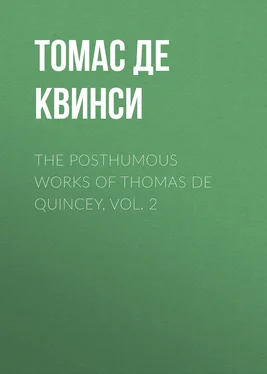It is true that Mr. De Quincey did make the mistake of supposing Coleridge to have 'calculated on' a remark which Mrs. Coleridge justly characterises as a blind one. It was blind as compared with the fact resulting from grounds not then known; else it was not blind as a reasonable inference under the same circumstances.
If for the words 'more than fifteen years' we say sixteen or seventeen, as Coleridge died in 1834, this article would be written in 1850 or 1851.—Ed.
'The Saintly Herbert,' the brother, oddly enough, of the brilliant but infidel Lord Herbert of Cherbury; which lord was a versatile man of talent, but not a man of genius like the humble rustic—his unpretending brother.
In saying this, Coleridge unduly disparaged his own personal advantages. In youth, and before sorrow and the labour of thought had changed him, he must have been of very engaging appearance. The godlike forehead , which afterwards was ascribed to him, could not have been wanting at any age. That exquisite passage in Wordsworth's description of him,
'And a pale face, that seem'd undoubtedly
As if a blooming face it ought to be,'
had its justification in those early days. If to be blooming was the natural tendency and right of his face, blooming it then was, as we have been assured by different women of education and taste, who saw him at twenty-four in Bristol and Clifton. Two of these were friends of Hannah More, and had seen all the world. They could judge: that is, they could judge in conformity to the highest standards of taste; and both said, with some enthusiasm, that he was a most attractive young man; one adding, with a smile at the old pastoral name, 'Oh, yes, he was a perfect Strephon.' Light he was in those days and agile as a feathered Mercury; whereas he afterwards grew heavy and at times bloated; and at that gay period of life his animal spirits ran up naturally to the highest point on the scale; whereas in later life, when most tempestuous, they seemed most artificial. That this, which was the ardent testimony of females, was also the true one, might have been gathered from the appearance of his children. Berkeley died an infant, and him only we never saw. The sole daughter of Coleridge, as she inherited so much of her father's intellectual power, inherited also the diviner part of his features. The upper part of her face, at seventeen, when last we saw her, seemed to us angelic, and pathetically angelic; for the whole countenance was suffused by a pensive nun-like beauty too charming and too affecting ever to be forgotten. Derwent, the youngest son, we have not seen since boyhood, but at that period he had a handsome cast of features, and (from all we can gather) the representative cast of the Coleridge family. But Hartley, the eldest son, how shall we describe him ? He was most intellectual and he was most eccentric, and his features expressed all that in perfection. Southey, in his domestic playfulness, used to call him the Knave of Spades ; and he certainly had a resemblance to that well-known young gentleman. But really we do not know that it would have been at all better to resemble the knave of hearts. And it must be remembered that the knave of spades may have a brother very like himself, and yet a hundred times handsomer. There are such things as handsome likenesses of very plain people. Some folks pronounced Hartley Coleridge too Jewish. But to be a Jew is to be an Arab. And our own feeling was, when we met Hartley at times in solitary or desolate places of Westmoreland and Cumberland, that here was a son of Ishmael walking in the wilderness of Edom. The coruscating nimbus of his curling and profuse black hair, black as erebus, strengthened the Saracen impression of his features and complexion. He wanted only a turban on his head, and a spear in his right hand, to be perfect as a Bedouin. But it affected us as all things are affecting which record great changes, to hear that for a long time before his death this black hair had become white as the hair of infancy. Much sorrow and much thought had been the worms that gnawed the roots of that raven hair; that, in Wordsworth's fine way of expressing the very same fact as to Mary Queen of Scots:
'Kill'd the bloom before its time,
And blanch'd, without the owner's crime,
The most resplendent hair.'
Ah, wrecks of once blooming nurseries, that from generation to generation, from John Coleridge the apostolic to S. T. C. the sunbright, and from S. T. C. the sunbright to Hartley the starry, lie scattered upon every shore!
' Lackington's counter ': Lackington, an extensive seller of old books and a Methodist (see his Confessions ) in London, viz., at the corner of Finsbury Square, about the time of the French Revolution, feeling painfully that this event drew more attention than himself, resolved to turn the scale in his own favour by a ruse somewhat unfair. The French Revolution had no counter; he had , it was circular, and corresponded to a lighted dome above. Round the counter on a summer evening, like Phæton round the world, the Edinburgh, the Glasgow, the Holyhead, the Bristol, the Exeter, and the Salisbury Royal Mails, all their passengers on board, and canvas spread, swept in, swept round, and swept out at full gallop; the proximate object being to publish the grandeur of his premises, the ultimate object to publish himself.











